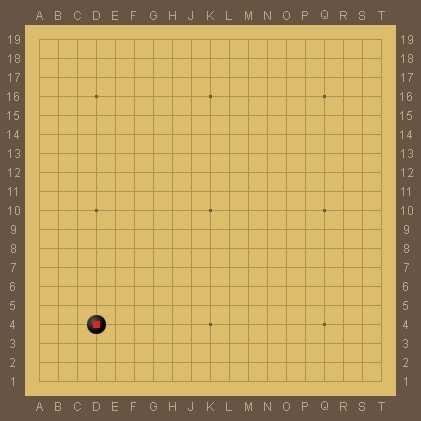34
2
See also: Make a move on a Go board.
Task
Go is a board game where two players (Black and White) place stones on the intersections of grid lines on a 19×19 board. Black moves first — for example, on D4:
In this challenge, you must take a Go board coordinate like D4 as input, and output an ASCII representation of a board with the first move played at the given point.
Note that there is no column I. This is, historically, to reduce confusion with J and L.
This output consists of 19 lines, each containing 19 characters. The point with the stone on it is marked O. Empty points on the board are shown as ., except for the nine star points (at D4, D10, D16, K4, K10, K16, Q4, Q10, and Q16), which are marked *.
For example, given F5 as an input, your answer’s output must be:
...................
...................
...................
...*.....*.....*...
...................
...................
...................
...................
...................
...*.....*.....*...
...................
...................
...................
...................
.....O.............
...*.....*.....*...
...................
...................
...................
And given Q16 as input, your output must be:
...................
...................
...................
...*.....*.....O...
...................
...................
...................
...................
...................
...*.....*.....*...
...................
...................
...................
...................
...................
...*.....*.....*...
...................
...................
...................
Rules
You may write a function that takes the coordinate as an argument, or a program that reads the coordinate from the command line or from
STDIN.You may choose to accept input either in lower-case or upper-case, but your answer doesn’t need to handle both.
The input is always a single string like
a1orT19, never a string + number or two strings.If you write a full program, your answer must be printed to
STDOUTas a string, optionally followed by a trailing newline. If your answer is a function, you may print toSTDOUT, or return a string, or return an array/list of strings (rows), or return a two-dimensional array or nested list of characters.This is code-golf. The shortest answer in bytes wins.

Just to be sure, "the coordinate as an argument" is meant to imply that we cannot take two arguments, like
f("G", 14), correct? – FryAmTheEggman – 2016-08-08T16:45:56.010Correct. ------ – Lynn – 2016-08-08T16:48:51.833
8Congrats on 20k!! – Luis Mendo – 2016-08-08T17:03:32.017
2"This is, historically, to reduce confusion with J and L." But both J and L are on the board??! – Fatalize – 2016-08-08T20:11:13.067
2Yep. Also, of course, the missing letter has probably caused more confusion and surprise than anything… – Lynn – 2016-08-08T20:14:09.230
2@Fatalize, J and L look quite distinct since the lower parts turn in separate directions. As with j and l, one descends, the other goes up. But i and j are a bit similar, and so are i, l and I... – ilkkachu – 2016-08-09T00:38:46.373
@Fatalize Yes, and I is not, so that you can't confuse I with J or I with L. – user253751 – 2016-08-10T01:59:44.437